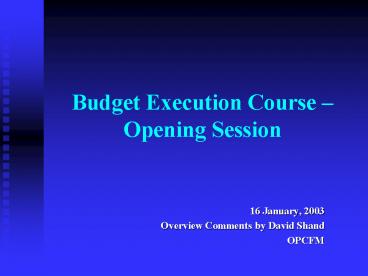Budget Execution Course - PowerPoint PPT Presentation
1 / 6
Title:
Budget Execution Course
Description:
Does the government care about the budget? Is it just a pro-forma exercise of limited interest, rather than what we assume it ... The three (or four) levels of ... – PowerPoint PPT presentation
Number of Views:24
Avg rating:3.0/5.0
Title: Budget Execution Course
1
Budget Execution Course Opening Session
- 16 January, 2003
- Overview Comments by David Shand
- OPCFM
2
- Does the government care about the budget? Is it
just a pro-forma exercise of limited interest,
rather than what we assume it should be a key
mechanism for determining government priorities
and ensuring service delivery?
The three (or four) levels of objectives of PFM
systems. Budget execution must assist in
achieving these objectives
- aggregate fiscal control
- strategic resource allocation
- operational efficiency
- (external accountability)
3
What level of PFM performance should we expect
from developing countries? But problems may
reflect lack of incentives for good budget
execution rather than lack of capacity.
Problem of formal rules versus informal rules.
What are the incentives for compliance or
non-compliance. Avoid just technical fixes.
Are donors and their requirements sometimes part
of the problem?
To what extent can we improve budget execution in
isolation from overall public sector reform?
4
Budget preparation and execution issues are
inextricably linked. Many issues or problems in
budget execution arise from issues or problems in
budget preparation processes. For example
- scope of the budget
- realism can it be implemented?
- budget preparation dialogue do ministries
understand what they have been allocated for
what? - basis of accounting does it follow the budget?
5
Different basis of budget or point of control
- obligations (commitments)
- cash payments
- costs
Different systems (anglophone, francophone) may
use a different point of control.
Importance of a common basis of budgeting and
accounting if we are to monitor and report budget
execution surprising how often they diverge
(accountants isolated from the budget office)
6
Importance of internal controls. This concept is
not understood in some countries rather
inspections and audits
Importance of good fiscal reporting but we need
international standards, and timely, reliable
information
Getting value from audit institutions - there
needs to be something to audit, avoid a gotcha
approach, add to the credibility of financial
statements. But to what extent is there
political or public interest in the past?
Getting value from legislative review.
Legislatures may be part of the problem rather
than of the solution. Again, is there much
interest in past events?































